Twenty-Something Tuesday
[divider][/divider]
Black Hawk Down
by Mark Bowden
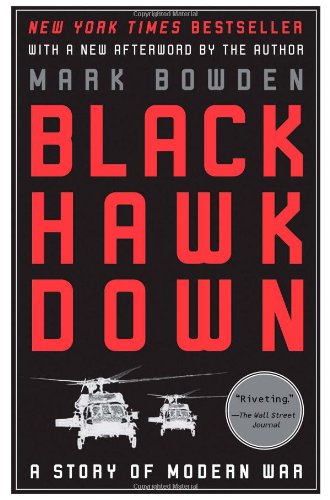
Katie: This book is singlehandedly responsible for my majoring in international relations, studying war history and making me realize there is a whole big world outside my little portion of it. Following soldiers on a peacekeeping mission to Somalia, Bowden through brilliant nonfiction narrative storytelling really captures the soldiers, the complicated dichotomy of peacekeeping amidst a despot starving his people, and the untenable position of a no-fire mission going hot.
Speaker for the Dead
by Orson Scott Card

Katie: If you want to discuss falling in love with the power of words, look no farther than “Speaker for the Dead.” Combining the power of philosophy, the dignity in even the harshest of lives, and the need to have a platform to speak the truth, this sequel (but easily acts as a standalone) changed the whole way I perceived philosophy and how I thought about our short trip in this world. It also confirmed why I needed to keep studying philosophy, even if it would never get me a job.
Confederates in the Attic: Dispatches from the Unfinished Civil War
by Tony Horowitz
Michelle: Before I read this book, I had never encountered a text woven from history, journalism, and memoir. Immediately, I knew that my goal in life would be to write a book of this genre – I decided to try my hand at writing and have never looked back. The way Horowitz presents the relationships between present day occurrences and events long past is genius, and he never fails to deliver powerful insights with wit and humor. To say that he’s one of my writing heroes is a massive understatement. When I met him at an event in Charlottesville and told him that I wanted to be a writer, he laughed (not too unkindly) and said, “Good luck!”
His Dark Materials
by Phillip Pullman

Rebekah: I first read “Northern Lights” when I was 11, and a devout Christian. The series is written as the antithesis to what the author (Phillip Pullman) saw as the “Christian propaganda” that children in the Narnia generations had grown up with. But instead of being affronted or offended by the ideas in the book, I found them refreshing. The themes were confronting and made me examine my faith from all angles. Would the world be a better place without my religion? Was my church like “The Authority” that sought to control the minutae of people’s lives? I’ve read the series every single year since, and every year something different about the series resonates me. Sometimes it’s the romance that blossoms between the young couple. Sometimes it’s the philosophical questions threaded throughout the story. “His Dark Materials” made me question myself and my religion, and was my companion as I marched through the emotional turmoil of puberty with the main characters as companions.
On The Road
by Jack Kerouac

Bridey: I was fifteen when I walked into the small, local bookstore and picked up a copy of Kerouac’s landmark book. I was a ravenous reader from a young age, but I had never encountered anything like the thrilling joy and raw emotion of Kerouac’s writing. Over the years I’ve often thought back to the feeling his work elicits, particularly the sense of awe at the world, and it’s helped me keep my head when things are feeling too overwhelmingly heavy. “On The Road” was the first Kerouac book I read, and although others have edged it out of the top spot I’ll never forget how engrossing it was to tumble through those pages and across country with Sal Paradise.
A Song of Ice and Fire
by George RR Martin

Bridey: There are books that get under your skin, and then there is “ASOIAF.” I was late to the party — I only read the books after binge watching the first two seasons of the HBO series last Spring. I’m not really a fantasy fan, but I read all five monstrous books in one month. I’m now reading the series for a second time, because once you throw yourself into Westeros it’s hard to climb back out. The series is a rollercoaster that brilliantly challenges concepts of right and wrong, with most characters living in the gray area. It also explores some of the darkest instincts and most cruel behaviors man can display. “ASOIAF” will chill you, disturb you, and leave you begging to know what happens next.
Into the Wild
by Jon Krakauer

Eline: What makes this book so special to me is that its movie adaptation happens to be my all time favorite movie too and my love for both of them grew simultaneously. It is such a rare thing when a book and a movie go together so well and actually complement each other instead of one overshadowing the other. Without Krakauer’s thorough and obsessive research into Chris McCandless’ final months, tracing his every footstep, finding and interviewing all the people Chris made an impression on along the way and even gaining the trust of his closest family, we would never have known the story of this impressive, imperfect and idealistic young man. Even though it is a non-fiction story, Krakauer is a master at drawing you into the narrative and eagerly devouring every last detail he reveals of Chris McCandless’ life and death.
The Lord of the Rings
by J.R.R. Tolkien
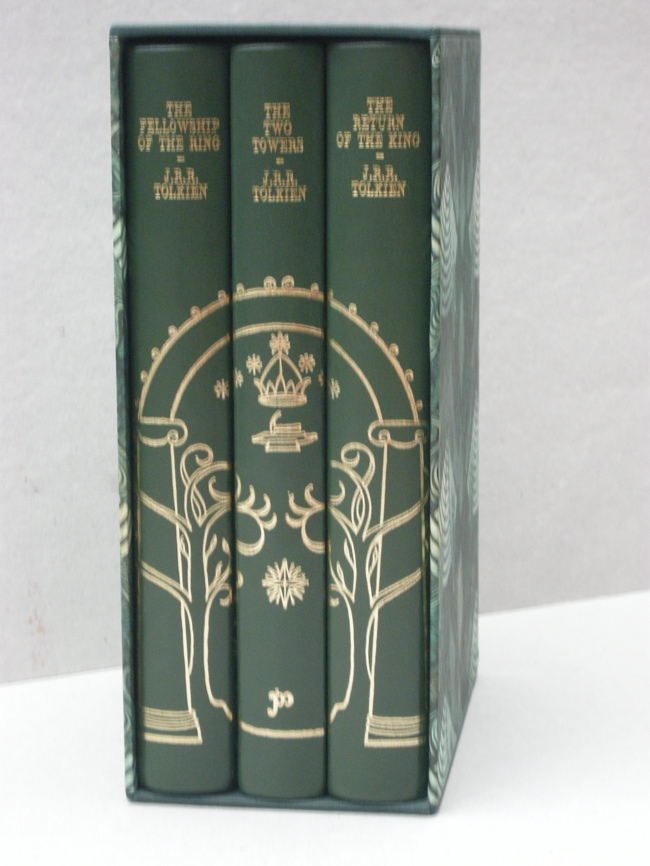
Lindsey: One of the classic tales that (by now) everyone has heard of, read, or seen, but in my family it’s a way of life. We are hardcare “LOTR” fans complete with “LOTR” Trivial Pursuit (which I am proud to say I’ve won on occasion), “LOTR” themed glassware and the occasional trivia book. It’s a massively epic story about people who don’t want to leave their comfort zone, but are forced to take up this quest to destroy a dark power. It’s fantasy at it’s finest and it’s filled with characters you can relate to and a lesson about good and evil. It’s depth makes it one of my favorite stories and it’s movie adaptations make for every ‘family night’ I can remember.
The Host
by Stephanie Meyer

Lindsey: I’m sure for all of us irritated and upset with “Twilight” this might seem like a weird choice, but it’s one of my favorite stories. It’s a very long book, and while reading it I continually thought it was the worst book, there was so much exposition and back story before you got to the heart of the book. In the end, I found it to be the most enjoyable, fresh, and captivating story I’d read in a while. It got me out of my biggest book funk and it reminded what I love in stories. Something that’s bigger than me, a story on a grander scale that includes all my favorite standbys: aliens, heartbreak, and characters that are as complex and real as people I know.
The Chronicles of Narnia: The Lion, the Witch and the Wardrobe
by C.S Lewis

Rachel: There is something so magical about the first book a young girl reads in which the words take her into another world. A world so beautiful and compelling that she doesn’t want to leave. A book that begins her lifetime love of reading. That is “The Lion, the Witch and the Wardrobe,” for me.
The Last Song
by Nicholas Sparks

Claire: I know that it seems a bit weird odd to say that the king of romance novels changed my life, to hear me out on this one. When I was in high school, I kept myself busy with homework and a social life, but about two months before the movie came out, I decided to give this a read. Any free minute I had, I devoted it to this book, and it re-ignited my love for reading that I had lost in the bustle of high school. This was the first book to make me cry, as well as appreciate my relationship with my parents. It is definitely a page turner and I still recommend it to people, as well as to read it BEFORE seeing the movie. Better experience.
Persuasion
by Jane Austen

Angela: While everyone loves to point out that Austen is one of the earliest romance writers, “Persuasion” holds a much deeper message for me. It is my favorite book of Austen’s, and Anne Elliot, is an interesting character who after turning down Captain Wentworth’s marriage proposal is resigned to her decision. She is perhaps one of the strongest of Austen’s characters, she initially allows her family to persuade her that Captain Wentworth is not “fitting” of her station. Eventually, she decides not to let anyone convince her to do something she does not want.The deeper message is that you are the author of your happiness, and that ultimately, you must decide what makes you happy. This is a lesson that many twenty somethings struggle with, especially when we are trying to figure out what we want to do with the rest of lives.
The Dragonriders of Pern (Series)
by Anne McCaffrey
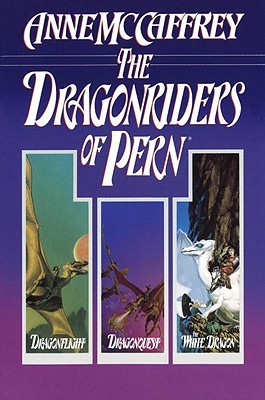
Kelsey: I was a fan of McCaffrey’s work before I even realized it when I read her “Acorna” series when I was in middle school. But the “Dragonriders of Pern” series far surpasses anything else that she’s written. “Dragonflight,” “Dragonquest,” and “The White Dragon” are the core of the series and immediately grabbed my attention. I consider McCaffrey one of the primary sci-fi/fantasy writers that all the other authors simply aspire to be. She creates a world and characters that are intricate and nuanced enough to sustain a series (not all chronological) that contains somewhere around 15-20 books, with “The Harper Hall Trilogy” on the side that’s also truly excellent.
The dragons choose their riders and they are bonded for life. There’s adventures, romance, planet crises, history, and more. Pern is a self-sustaining planet that produces stories galore. Definitely worth checking out the core trilogy at least!
P.S. Stick with the ones that are only written by her. Later on her son tries to pitch in and it’s just terrible.
Gone With the Wind
by Margaret Mitchell

Lydia: I read “Gone With The Wind” in fifth grade. I wish I could say that I was inspired to read the novel because of my love for the antebellum/American Civil War Era or because I had seen the movie version a year earlier, and fell in love Clark Gable. I decided to check out the 1,037 page book from my elementary school library because it was “worth” 63 points in the school’s Accelerated Reader program; I was determined to hold my spot as school champion. Although I ended up losing my title that year, “Gone With the Wind,” maintains the spot as my favorite book of all time. It inspired me to read the follow-up novels, “Rhett Butler’s People” (definitely worth a read), and “Scarlett” (probably one of the worst sequels ever written). It is one of those novels that everyone should be familiar with, as some of the themes are as culturally relevant as they were 150 years ago.
Invisible Cities & If on a Winter’s Night a Traveler
by Italo Calvino

Zuska: I read this in tenth grade and it had an immense impact on my writing style. Ninth grade had been about formulaic writing even down to the sentence count. My tenth grade English teacher told us “you’ve learned the rules, now forget them.” Creative writing when labeled as such always freaked me out. But Italio Calvino’s use of imagery, page-long sentences and unconventional plot lines gave me a window into the freedom of writing. As long as you write well you can create your own rules. There’s no “getting” Italo Calvino. You just have to go along for the ride. “Invisible Cities” is told in the voice of Marco Polo recounting his explorations of Europe to Kublai Khan. Each city is described as if it were a living entity using objects to describe the city. No actual recognizable names are used leaving much of the book up to the reader’s interpretation. “If on a Winter’s Night a Traveler” is a story about the experience of trying to finish a book. Seriously. Every other chapter is the opening chapter in a different book. The chapters in between are told in the second person as you the reader search for the “real” Italio Calvino book and encounter printing errors, conspiracies, and many other completely ridiculous plot twists. Sound crazy? Well it is. But I urge you to give it a go.
The Captive Mind
by Czeslaw Milosz

Zuska: I grew up in an evangelical cult filled with groupthink and after I got out of it I struggled with coming to terms with why my parents and others would willing choose to enter this society. In “The Captive Mind,” Milosz explores several case studies of Polish intellectuals as they became immersed in the Communist Party. This is both an excellent window into communist Poland as well as into the psychology of the individual. When addressing the issue of why people join entities such as the Communist Party (or evangelical cults) we want to believe that they’re stupid and unenlightened. It’s just too painful to believe that it’s a rational decision. Milosz provides a well reasoned approach that seeks not just to educate but also, amazingly enough, spark pity in the reader. If you want a guide to the rise of totalitarianism of course you read Hannah Arendt who, literally, wrote the book. But if you want to get a glimpse into the human tragedy read Milosz.
Cunt: A Declaration of Independence
by Inga Muscio

Alec: I came across “Cunt” in my beret wearing, shisha smoking, Communist revolutionary phase when I was a sophomore in college. I started reading the nearly 400-page book in the evening and finished it just as the sun was about to rise, covered in sweat and feeling like I had just had my brains smashed in by a slice of lemon wrapped round a large gold brick. In “Cunt”, Muscio describes the way in which social forces align themselves to make women feel ashamed about their bodies. Muscio’s brash and fiery brand of feminism appealed to me. I credit “Cunt” as the catalyst for my identity as a feminist and my love for studying sex, gender, and sexuality. I signed up for Women’s Studies 101 shortly after I read the book. As I prepare to begin my Ph.D. in Gender Studies in the fall, I can’t help but wonder what my life would have been like if I hadn’t encountered “Cunt.” Even though my enthusiasm for some of Muscio’s views has waned, “Cunt” undeniably changed my worldview and, with it, the course of my life.
Fay
by Larry Brown
Haley: “Fay” was recommended to me by a good friend of mine (here’s lookin’ at you, Chris) who, up until the recommendation of this book, had a completely different set of interests in books than I did. He liked Southern gothic lit—I liked classics and YA. “Fay” changed that in me, no doubt. It is stunningly written and happy, sad, and terrible all at the same time, and by the end of the book you’ve had your heart wrenched out and pieced up and knocked around a bunch, but you feel good about it. Brown was the first Southern gothic novelist I ever read, and now I can’t get enough of the genre. As a reader, I learned that not every book has to end how you want it. As a writer, I learned you can write pretty about ugly things. I’ll be forever grateful for that.
Sophie’s World
by Jostein Gaarder
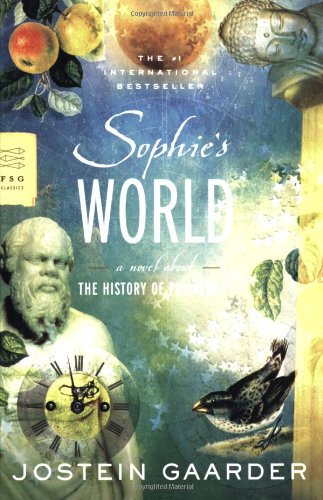
Hannah: “Sophie’s World” is a novel following a young girl as she learns about the history of philosophy, both a fictional mystery and a non-fiction introduction to philosophical thinking. I read this book my senior year of high school and was convinced that the question “who are you?” was something worth pursing. I went on to study philosophy in college thanks to Gaarder’s introduction. “The only thing we require to be good philosophers is the faculty of wonder.”
White Oleander
by Janet Fitch

Kirstie: I first read “White Oleander” in my early teens, having not yet seen the film adaptation. To this day I look at that book as the one that really got me thinking about myself, my sexuality and my opinions on life and the world around us. During a time of personal struggle where I felt very alone and so completely unsure about things, Fitch gave me one of my favorite quotes to live by—”Loneliness is the human condition. Cultivate it. The way it tunnels into you allows your soul room to grow. Never expect to outgrow loneliness. Never hope to find people who will understand you, someone to fill that space. An intelligent, sensitive person is the exception, the very great exception. If you expect to find people who will understand you, you will grow murderous with disappointment. The best you’ll ever do is to understand yourself, know what it is that you want, and not let the cattle stand in your way.”
The Harry Potter Series
by J.K. Rowling

Literally, Darling: While not everyone (though damn near) loves this series, no one can argue it changed the way kids (teens, adults) read, and made reading not just cool, but AWESOME. The “Harry Potter Series” gifted us with best friends, life lessons, and bonded us to our generation world-wide. Walk into most countries and mention Harry Potter, and we bet you can strike up a conversation. We laughed, cried, booed, and were deeply, emotionally connected to these books and characters. We stayed up to all hours of the night reading them, and during the two year gap before the next release we stayed up to all hours talking about them obsessively. We learned the power of love is just as strong from a friend or parent as it is a partner, that hatred and bigotry destroys the world no matter what form it takes, and that cleverness, courage, and loyalty can save the world.
[divider][/divider]
Do you have a book that has changed your life? Tell us in the comments below or tweet us @LitDarling!
Share this:
- Click to share on Tumblr (Opens in new window)
- Click to share on Twitter (Opens in new window)
- Click to share on Facebook (Opens in new window)
- Click to share on Reddit (Opens in new window)
- Click to email a link to a friend (Opens in new window)
- Click to print (Opens in new window)
- Click to share on Pocket (Opens in new window)
- Click to share on LinkedIn (Opens in new window)
- Click to share on Pinterest (Opens in new window)







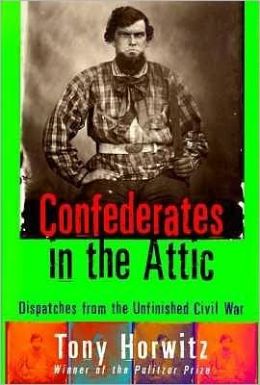


Lydia—I, too, read GWTW purely for the AR points! Now it’s one of the most influential books in my life. In fact, if you hadn’t put it on this list, I was going to. Love the rest of these books, too!